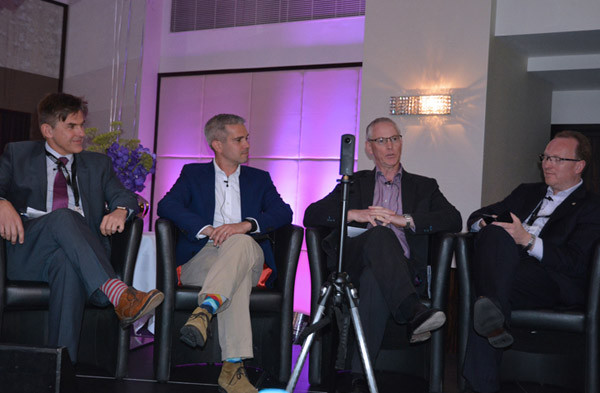✕

Column: industry Tag: hotel operators,star ratings,star-rating system Published: 2017-06-02 15:27 Source: Author:
Hotel operators are less convinced each day that star-rating systems bring meaningful value to the industry, according to speakers at the Boutique Lifestyle Hotel Summit, but owners are a bit more attached to the current rating model.

(From left to right) Nick Turner, Bespoke Hotels International; Josh Littman, Hard Rock International; Andrew Shaw, InterContinental Hotels Group, and Andy Townsend, Legacy Hotels & Resorts, speak at the Boutique Lifestyle Hotel Summit. (Photo: Terence Baker)
LONDON—Operators are seeing decreasing value in the traditional hotel star-rating system as guests no longer stick to one segment of the industry, brands are developed to cater to new demand and the changing world of lifestyle hotels makes the landscape more dynamic, according to sources.
But panelists speaking during the “Operators got talent” session at the Boutique Lifestyle Hotel Summit in May said owners still hold star ratings somewhat close to their hearts as it gives direction to their investment and a promise of how a property will be operated.
Panelists said this is important because the classification of hotels is a harder concept to get one’s hands around in Europe than in the U.S.
Josh Littman, VP of hotel development for Europe, the Middle East and Africa at Hard Rock International, said his pet peeve is when owners hyperbolize their hotel star ratings.
“Now there is so much blur,” Littman said. “Our Orlando property outperforms occupancy and (revenue per available room) of that market’s luxury market. Lifestyle is consumer preference.”
Nick Turner, managing director at Bespoke Hotels International, said it should be more about rate potential than something ethereal like star ratings. He said that kind of thinking was key for his company’s Hotel Gotham property, which opened in 2015 in Manchester, England.
“We’ve never said it was 5-star. It merely found its own price point,” Turner said.
Andy Townsend, CEO of Legacy Hotels & Resorts, which operates 19 United Kingdom hotels and one each in Spain and Macedonia, said star ratings still have a place, but only in the higher reaches of the segment span.
“In the 4.5-star-and-up market, customers might give you an idea of the worth of this, but not for, say, 3 star, as this is the space of conversion brands, and many hoteliers there have started self-regulating via brand audits,” Townsend said. “We’ve created a soup … I think the 3- and 4-star sector is incredibly confused.
“I want my staff to have a humane conversation with guests, not to make sure they get a newspaper in the morning, which is only required for rating purposes.”
Andrew Shaw, associate VP of hotel development at InterContinental Hotels Group, said brand standards will give star ratings some lasting power.
“We’ve concentrated on positioning our brands in their markets and consumers’ minds. Brand awareness and commitment,” Shaw said.
But Townsend said his hotels are adopting self-regulated brand audits. He added he has considered ending partnerships with some star-rating organizations.
“Up to 12 months ago, three times a year we still did mystery guests, but that can only be a moment in time, and the GM will only use it if the timing is right,” Townsend said.
Littman said if hoteliers were confused by all of this, consumers aren’t doing any better.
“Price is an important differentiator, but it is about service, and that is free,” he said.
Ratings redundancy
Panelists said owners are unlikely to root for the end of ratings systems, which ultimately means those systems could endure despite operator dislike.
SOPs, brand standards and strong, flexible management all add to the recipe of creating strong franchise systems, panelists said. Staff are trained to deliver these expectations and generally do so in a way that mean individual hotels can be easily ranked.
This is in no way a bad thing, panelists agreed, but the marketing and distribution of hotels cannot afford to be so rigid in a world of shifting tastes and guests choosing brands and segments depending on different travel requirements throughout any one year.
“Yes, we’ve established training programs for our partners,” Littman said. “Love all, serve all, take time to be kind, eye contact 10 feet out, et cetera, but we encouraged (staff) to be their own person, within the right degree of professionalism.”
Room size is another area in which traditional star ratings might dictate one set of criteria.
“Micro-boutique (hotels) are coming, with smaller rooms. That’s not necessarily a new thing, although in London you can definitely drive revenue via larger rooms and having suites,” Shaw said, who added IHG’s Hotel Indigo chain is an urban model that acts in a micro-boutique fashion.
Turner said Bespoke?removed flags from assets, which then removed the ceiling of what average daily rate was reachable.
“The consumer thought that £130 ($167.50) was all you could pay for a tired legacy brand,” Turner said. “If the brand is not so involved in the hotel, then it becomes like an (online travel agency).”
Turner also said at the Gotham, his introduction of a membership element was a plan not everyone thought would work.
“Seven hundred members paying £1,000 ($1,300) per year. People will pay for an exceptional experience, and exclusivity,” he said. “It is a strategy of moving away from being a pure business earning revenue in a commoditized product.”
Previous:American Hotel Income Properties REIT LP to Acquire 18 Hotel Northeastern U.S. Portfolio for US$407.4 Million
Next:Hotels, planners battle outside-the-block bookings
Hot key words
Hot Products
Popular Vendors